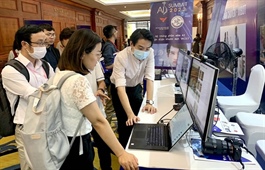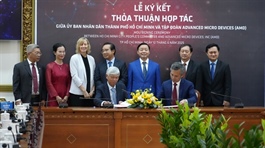New decree positions sci-tech as key driver of regional development
New decree positions sci-tech as key driver of regional development
The Vietnamese government issued a decree on June 12 to decentralise state management of science and technology to local people's committees.
Decree No.133/2025/ND-CP aims to enhance the autonomy and flexibility of localities in performing state management tasks on sci-tech, simplifying the process and procedures.

Photo: MoST |
It also aims to lay a strong foundation for provinces and cities to actively advance science, technology, and innovation; accelerate digital transformation; establish regional innovation hubs; and support tech enterprises and startups tailored to local needs.
78 decentralisation tasks have been proposed, with a roadmap that includes preparation this year, pilot implementation in 2026, and nationwide rollout starting in 2027.
Specifically, in the telecommunications sector, localities are authorised to grant licences to provide fixed-line telecommunications services, handle violations, and request termination of service provision.
For IT and digital transformation, localities are authorised to develop and implement their own digital transformation strategies.
In intellectual property and industrial property, the provincial people's committees are empowered to decide patent applications, the establishment of ownership rights, and the handling of infringements within localities.
Local governments may independently evaluate and approve provincial-level scientific research projects, aligned with regional socioeconomic development priorities. They will also have the authority to evaluate and approve technology transfer contracts, including permitting the establishment of foreign-invested scientific organisations and their branches.
Provincial administrations are responsible for managing all aspects of radio frequency licensing, including the issuance, renewal, and revocation of licences for radio frequencies and equipment for broadcasting stations. Provinces can also recognise organisations that are qualified to grant amateur radio certificates, train, and test maritime radio operators, in accordance with the provisions of Decree No. 63/2023/ND-CP.
Local authorities are also responsible for issuing, amending, re-issuing or revoking certificates related to inspection, testing, assessment and certification of product quality management systems.
The newly issued decree introduces administrative reforms through six key appendices, streamlining regulations by eliminating 86 redundant requirements related to documentation and processing times. The reforms specifically target: measurement and quality standards (33 provisions), radio frequency management (9 provisions), high-tech industry regulations (15 provisions), industrial park operations (17 provisions), technology transfer procedures (4 provisions), and science/technology activity registration (8 provisions). These changes aim to reduce bureaucratic burdens while maintaining regulatory oversight across critical sectors.
The Ministry of Science and Technology (MoST) will periodically inspect and monitor the implementation process at the local level, and provide guidance on handling to be emerged situations to maintain consistency and quality of industry management.
Meanwhile, local people's committees are responsible for developing a plan to implement the decree, assigning focal points for implementation, issuing regulations on inter-sectoral coordination, organising internal inspections and periodically reporting on implementation results to the MoST.
- 18:41 13/06/2025


























